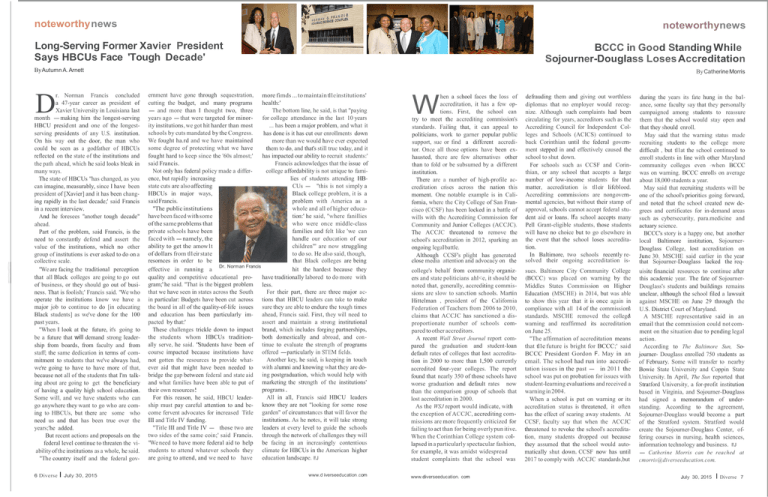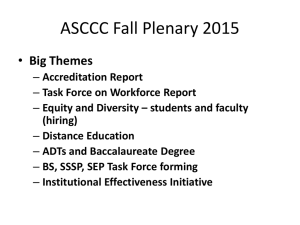D W noteworthy
advertisement

noteworthy news noteworthynews Long-Serving Former Xavier President Says HBCUs Face 'Tough Decade' BCCC in Good Standing While Sojourner-Douglass Loses Accreditation By Autumn A. Arnett r. Norman Francis concluded a 47-year career as president of Xavier University in Louisiana last month -making him the longest-serving HBCU presid ent and one of the longestserving presidents of any U.S. institution. On his way out the door, the man who could be seen as a godfather of HBCUs reflected on the state of the institutions and the path ahead, which he said looks bleak in many ways. The state of HBCUs "has changed, as you can imagine, measurably, since I have been president of [Xavier] and it has been changing rapidly in the last decade;' said Francis in a recent interview. And he foresees "another tough decade" ahead. Part of the problem, said Francis, is the need to constantly defend and assert the value of the institutions, which no other group of institutions is ever asked to do on a collective scale. "We are facing the traditional perception that all Black colleges are going to go out of business, or they should go out of business. That is foolish;' Francis said. "We who operate the institutions know we have a major job to continue to do [in educating Black students] as we've done for the 100 past years. "When I look at the future, it's going to be a future that will demand strong leadership from boards, from faculty and from staff; the same dedication in terms of commitment to students that we've always had, we're going to have to have more of that, because not all of the students that I'm talking about are going to get the beneficiary of having a quality high school education. Some will, and we have students who can go anywhere they want to go who are coming to HBCUs, but there are some who need us and that has been true over the years;'he added. But recent actions and proposals on the federal level continue to threaten the viability of the institutions as a whole, he said. "The country itself and the federal gov- D 6 Diverse I July 30, 2015 By Catherine Morris ernment have gone through sequestration, more fimds ... to maintain tl1e institutions' cutting the budget, and many programs health:' - and more than I thought two, three The bottom line, he said, is that "paying years ago - that were targeted for minorfor college attendance in the last 10 years ity institutions, we got hit harder than most ... has been a major problem, and what it schools by cuts mandated by the Congress. has done is it has cut our enrollments down We fought ha.rd and we have maintained more than we would have ever expected some degree of protecting what we have them to do, and that's still true today, and it fought hard to keep since the '60s almost;' has impacted our ability to recruit students:' said Francis. Francis acknowledges that the issue of college affordability is not unique to famiNot only has federal policy made a difference, but rapidly increasing lies of students attending HBstate cuts are also affecting CUs - "this is not simply a HBCUs in major ways, Black college problem, it is a said Francis. problem with America as a "The public institutions whole and all of higher educahave been faced with some tion:' he said, "where fanillies of the same problems that who were once middle-class private schools have been families and felt like 'we can faced with - namely, the handle our education of our ability to get the amow1t children"' are now struggling of dollars from tl1eir state to do so. He also said, though, resomces in order to be that Black colleges are being Dr. Norman Francis effective in running a hit the hardest because they quality and competitive educational prohave traditionally labored to do more with gram;' he said. "That is the biggest problem less. For their part, there are three major acthat we have seen in states across the South in particular: Budgets have been cut across tions that HBCU leaders can take to make the board in all of the quality-of-life issues sure they are able to endure the tough times and education has been particularly im- ahead, Francis said. First, they will need to pacted by that:' assert and maintain a strong institutional These challenges trickle down to impact brand, which includes forging partnerships, the students whom HBCUs tradition- both domestically and abroad, and con ally serve, he said. "Students have been of tinue to evaluate the strength of programs course impacted because institutions have offered -particularly in STEM fields. Another key, he said, is keeping in touch not gotten the resources to provide whatever aid that might have been needed to with alumni and knowing what they are dobridge the gap between federal and state aid ing postgraduation, which would help with and what families have been able to put of marketing the strength of the institutions' programs . their own resources:' All in all, Francis said HBCU leaders For this reason, he said, HBCU leadership must pay careful attention to and be- know they are not "looking for some rose come fervent advocates for increased Title garden" of circumstances that will favor the institutions. As he notes, it will take strong III and Title IV funding. "Title III and Title IV - those two are leaders at every level to guide the schools two sides of the same coin;' said Francis. through the network of challenges they will "We need to have more federal aid to help be facing in an increasingly contentious students to attend whatever schools they climate for HBCUs in the American higher education landscape. l!J are going to attend, and we need to have www.d iverseeducation .com hen a school faces the loss of accreditation, it has a few options. First, the school can try to meet the accrediting commission's standards. Failing that, it can appeal to politicians, work to garner popular public support, sue or find a different accreditor. Once all those options have been exhausted, there are few alternatives other than to fold or be subsumed by a different institution. There are a number of high-profile accreditation crises across the nation this moment. One notable example is in California, where the City College of San Francisco (CCSF) has been locked in a battle of wills with the Accrediting Commission for Community and Junior Colleges (ACCJC). The ACCJC threatened to remove the school's accreditation in 2012, sparking an ongoing legal battle. Although CCSF's plight has generated close media attention and advocacy on the W defrauding them and giving out worthless diplomas that no employer would recognize. Although such complaints had been circulating for years, accreditors such as the Accrediting Council for Independent Colleges and Schools (ACICS) continued to back Corinthian until the federal government stepped in and effectively caused the school to shut down. For schools such as CCSF and Corinthian, or any school that accepts a large number of low-income students for that matter, accreditation is tl1eir lifeblood. Accrediting commissions are nongovernmental agencies, but without their stamp of approval, schools cannot accept federal student aid or loans. If a school accepts many Pell Grant-eligible students, those students will have no choice but to go elsewhere in the event that the school loses accreditation. In Baltimore, two schools recently resolved their ongoing accreditation is- during the years its fate hung in the balance, some faculty say that they personally campaigned among students to reassure them that the school would stay open and that they should enroll. May said that the warning status made recruiting students to the college more difficult , but tl1at the school continued to enroll students in line with other Maryland community colleges even -when BCCC was on warning. BCCC enrolls on average about 18,000 students a year. May said that recruiting students will be one of the school's priorities going forward, and noted that the school created new degrees and certificates for in-demand areas such as cybersecurity, para.medicine and actuary science. BCCC's story is a happy one, but another local Baltimore institution, SojournerDouglass College, lost accreditation on June 30. MSCHE said earlier in the year that Sojourner-Douglass lacked the req- college's behalf from community organizers and state politicians ahl<e, it should be noted that, generally, accrediting commissions are slow to sanction schools. Martin Hittelman , president of the California Federation of Teachers from 2006 to 2010, claims that ACCJC has sanctioned a disproportionate number of schools compared to other accreditors. A recent Wall Street Journal report compared the graduation and student-loan default rates of colleges that lost accreditation in 2000 to more than 1,500 currently accredited four-year colleges. The report found that nearly 350 of those schools have worse graduation and default rates now than the comparison group of schools that lost accreditation in 2000. As the WSJ report would indicate, with the exception of ACCJC, accrediting commissions are more frequently criticized for failing to act than for being overly pun itive. When the Corinthian College system collapsed in a particularly spectacular fashion, for example, it was amidst widespread student complaints that the school was sues. Baltimore City Community College (BCCC) was pla ced on warning by the Middles States Commission on Higher Education (MSCHE) in 2014, but was able to show this year that it is once again in compliance with all 14 of the commission's standards. MSCHE removed the college's warning and reaffirmed its accreditation on June 25. "The affirmation of accreditation means that tl1e future is bright for BCCC;' said BCCC President Gordon F. May in an email. The school had run into accreditation issues in the past - in 2011 the school was put on probation for issues with student-learning evaluations and received a warning in 2004. When a school is put on warning or its accreditation status is threatened, it often has the effect of scaring away students. At CCSF, faculty say that when the ACCJC threatened to revoke the school's accreditation, many students dropped out because they assumed that the school would automatically shut down. CCSF now has until 2017 to comply with ACCJC standards,but uisite financial resources to continue after this academic year. The fate of SojournerDouglass's students and buildings remains unclear, although the school filed a lawsuit against MSCHE on June 29 through the U.S. District Court of Maryland. A MSCHE representative said in an email that the commission could not comment on the situation due to pending legal action. According to The Baltimore Sun, Sojourner- Douglass enrolled 750 students as of February. Some will transfer to nearby Bowie State University and Coppin State University. In April, The Sun reported that Stratford University, a for-profit institution based in Virginia, and Sojourner-Douglass had signed a memorandum of understanding. According to the agreement, Sojourner-Douglass would become a part of the Stratford system. Stratford would create the Sojourner-Douglass Center, offering courses in nursing, health sciences, information technology and business. l!J www.diverseeducation. com - Catherine Morris can be reached at cmorris@diverseeducation.com. July 30, 2015 I Diverse 7

